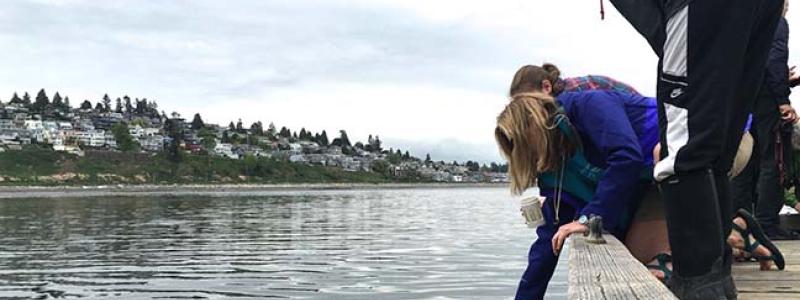From May 3 to 4, 2016, Trinity Western University hosted the TWU SeaChange Colloquium, a two-day interdisciplinary conference, to raise awareness about ocean change and how it affects our world.
As part of the first day, Karen Steensma, a biology professor at TWU, led a group of artists and scientists from TWU, UBC, Emily Carr, SFU, and several other universities on an educational beach walk down the White Rock pier on May 3. They had one thing in mind: plankton.
The plankton pull was an illustration of Steensma’s research, which indicates that the small organisms are key to identifying ocean change. “Overall plankton numbers, and also the different species of plankton presented at any given time, can give us many indications of what is going on in the oceans,” she says.
For Erica Grimm, a TWU art professor and the co-coordinator of the conference, ocean change is urgent.
“An increase in global temp turns into Bangladesh under water, displacement of huge groups of people, and seven meters of water levels rising,” she says. “It’s immoral and unethical for us not to take action."
In addition to Steensma’s research, the conference focused on ocean change research in mathematics and art. “Research shows that when data is processed through a variety of signing systems—whether they are word based, image based , aural, haptic, experiential and so on—that there is a much higher probability that new knowledge will, and can, arise.” says Grimm.
Later that day, several presenters shared their ocean research at Arocha Canada. Sam Pimentel, a TWU math professor, presented on mathematical models of sea surface temperatures. Edith Krause, a TWU art instructor, presented an art exhibition that included prints of life-size plankton floating among human swimmers.
The Sea Change Colloquium was the first of a series that began in October. According to Grimm, the interdisciplinary series has been a great success, and the group anticipates hosting more events in the future.
“Hearing research from a wide variety of methodological vantage points on the common topic of the global ocean is very stimulating,” she says. It is always energizing to continue to learn, amazing to hear what people are doing in their research and how research is unfolding.”

